
There is a growing concern for animal welfare in crustacean aquaculture, both among scientists, lawmakers, and the general public. However, studies on welfare are limited.
Scientists from the Leibniz-Institute of Freshwater Ecology and Inland Fisheries and the Alfred-Wegner-Institute, Helmholtz Centre for Polar and Marine Research published a scientific review on the physiological aspects of welfare and welfare monitoring.
They reviewed existing scientific literature on pain and distress in crustaceans, particularly in shrimp, to support a precautionary principle on animal welfare as established in fish.
Additionally, the study authors highlight established welfare indicators that support future attempts to optimize existing practices in crustacean farming.
Finally, the scientists identify welfare-related risks in practice, particularly in hatcheries, rearing, harvesting, anesthesia, transport, and humane slaughter, and highlight relevant issues for optimizing farming technology.
Nociception in crustaceans
Nociception is the sensory mechanism that allows animals to quickly detect and avoid potentially harmful stimuli to tissues, whether thermal, mechanical, or chemical.
Decapod crustaceans display nociceptive behavior, but primary nociceptors have only recently been described in one species.
Several studies have shown that acute and chronic noxious stimulation induces the expression of nitric oxide synthase (NOS) that synthesizes the neuronal messenger nitric oxide (NO) in both mammals and invertebrates.
Pain in crustaceans
While most animals have nociceptive reflex responses that protect them from harmful influences, some taxa have developed the capacity to experience pain.
Stay Always Informed
Join our communities to instantly receive the most important news, reports, and analysis from the aquaculture industry.
Evidence from behavioral studies suggests that decapod crustaceans have the capacity to “experience pain/suffer” because they show responses consistent with pain and have relatively complex cognitive abilities.
Injured crustaceans exhibit activities such as rubbing, limping, or grooming, indicating awareness of the site of injury and some attempt to reduce further damage.
In extreme cases, injured appendages may be discarded (autotomy). Various researchers suggest that autotomy is mediated by a pain-like experience. Furthermore, autotomy can reduce harvest biomass as individuals use energy resources to regenerate limbs at the expense of overall body growth.
Wellbeing measures for shrimp
The assessment of stress, suffering, and pain as the basis for ensuring animal welfare and the sustainable and species-appropriate farming requires a combination of behavioral, morphological, and physiological parameters.
However, in practice, behavioral indicators of stress, suffering, and pain can be considered to promote preventive medical care and, therefore, early detection of stress, injuries, and diseases.
In addition to stress and suffering detection, knowledge of behavioral patterns expressed by crustaceans throughout their life stages helps promote crucial aquaculture measures such as feed efficiency, growth rates, and reproductive success.
In this regard, behavioral observations are already extremely important indicators for the aquaculturist.
In captivity, where there is no need to compete for food or mates, and space limitations prevent escape, aggression induces stress and injuries, thus being detrimental to animal welfare.
Thus, the aquaculturist must take measures to reduce or suppress the motivation to express these natural but maladaptive behaviors in farming systems.
The researchers emphasize that to identify negative states, promote beneficial cultural practices, and allow animals to express the necessary behaviors for their welfare, the following steps should be followed:
- Establish what behaviors are normal under certain environmental conditions.
- Combine physiological and morphological indicators to assess the importance of behaviors for animal welfare.
Implications for good aquaculture practices
Organisms in aquaculture farming can experience stress through various pathways. Understanding the interrelationships is necessary to recognize and compensate for the issues.
From a broad perspective, the production cycle is divided into periods, and scientists discuss the respective periods regarding the major concerns for animal welfare.
The scientists present selected studies that have evaluated the most common stressors in breeding and reproduction, in the hatchery, during rearing, harvesting, transport, and slaughter.
In crustaceans, reducing stress is sought in order to decrease susceptibility to diseases, improve growth and feed conversion, and reduce cannibalism and aggression within the farming system.
Conclusion
“With regard to the ongoing debate on the welfare of decapods, a better understanding of the underlying mechanisms of nociception, pain, and distress is required to safeguard the proper rearing of animals in accordance with the Five Freedoms concept,” the scientists conclude.
They also emphasize the need for easily accessible physiological biomarkers and comprehensive behavioral studies to monitor welfare in practice.
Finally, the scientists recommend that scientifically based welfare considerations should be used to further improve existing technology, communicate welfare to customers, and better safeguard welfare in crustacean farming.
The study was funded by the Deutsche Bundesstiftung Umwelt as part of the CrustaWohl project.
Contact
Sven Wuertz
Department Fish Biology, Fisheries and Aquaculture
Leibniz-Institute of Freshwater Ecology and Inland Fisheries
Müggelseedamm 310, Berlin 12587
Germany
Email: sven.wuertz@igb-berlin.de
Reference (open access)
Sven Wuertz, David Bierbach, Mirko Bögner, “Welfare of Decapod Crustaceans with Special Emphasis on Stress Physiology“, Aquaculture Research, vol. 2023, Article ID 1307684, 17 pages, 2023. https://doi.org/10.1155/2023/1307684
Editor at the digital magazine AquaHoy. He holds a degree in Aquaculture Biology from the National University of Santa (UNS) and a Master’s degree in Science and Innovation Management from the Polytechnic University of Valencia, with postgraduate diplomas in Business Innovation and Innovation Management. He possesses extensive experience in the aquaculture and fisheries sector, having led the Fisheries Innovation Unit of the National Program for Innovation in Fisheries and Aquaculture (PNIPA). He has served as a senior consultant in technology watch, an innovation project formulator and advisor, and a lecturer at UNS. He is a member of the Peruvian College of Biologists and was recognized by the World Aquaculture Society (WAS) in 2016 for his contribution to aquaculture.




